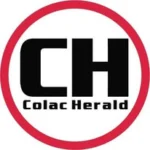A WETLANDS researcher says building a causeway or bridge across Lake Colac could damage the iconic lake’s ecosystem.
Professor warns against Lake Colac causeway

Professor Peter Gell has studied Lake Colac and other wetlands and has warned against putting a highway across the lake.
6 Responses to “Professor warns against Lake Colac causeway”
Comments are closed.









Some of You people who are pushing this ridiculous idea should live in Melbourne then you will see what real traffic congestion is like also those lines you have marked through the North of the lake has just devalued that land! I mean who would want to buy a farm now where that line goes though knowing that one day there may be a highway running straight through they middle I bet the Shire didn’t even think about that!
The pollution problems caused by the lake drying out are all the more reason to have a causeway. The reality is the lake has been close to drying out for almost a decade now. The vast size makes it like a huge evaporation pan. There’s been no action to address the pollution or lack of recreation. The shallow depth causes sediments to become suspended and heavy metals to get back into the food chain. Professor Gell should be aware of that.
In regard to the road pollution, yes that is an issue. Oil, fuels, rubber compounds do make their way into the water system. But if Professor Gell studied Colac’s road and storm water system, he’d realize that is a problem today with the city’s stormwater carrying those pollutants to the lake: the same traffic, bypass or not.
So once you get to the realization that the very problems Gell outlines exist today, and to the same extent (if not worse) than if there was a bypass, form an environmental and scientific stand point, his comments certainly don’t lead to the conclusion against a causeway on the lake.
One issue is the increase in suspended solids during construction. Handled well though, it is unlikely to be of a significant impact compared to the current problems. For example, as the causeway is built, the area ahead is dug/dredged, using dredging curtains to minimise mixing with any other water in the lake. The moved material could then be used to form wide buffers around the causeway. using simple geo-fabrics to hold the material in place and then vegetating it.
Likewise, if you decrease the lake size, you decrease evaporation, increase water depth, decrease the level of suspended solids in the long term. And if you then have a higher water level, one that is more sustainable than the current lake fluctuations, it makes it easier to implement artificial wetlands to help remove pollutants from stormwater, as well as control erosion.
If Professor Gell’s solution to the pollution problems existing in Lake Colac today is to do nothing, he’s clearly wrong.
We do not need this bypass! who is pushing for this anyway? the shop owners who are inside from 9am to 5:30pm? we are yet to hear who is doing all the complaining also if you were to put a bypass in then you wait everyone will be whinging about the lack of business, I am yet to hear of anyone who is wanting to waste $400 Million on this absurd idea, time for these whingers to come forward
Hi Jack,
Currently there doesn’t seem to be a real need, and the studies aren’t definitive. I’d say a lot of the initial push most likely came from Murray St shop owners who wanted a truck bypass, to get rid of the trucks. That was met with a lot of opposition as the plans were initially just to dump the trucks onto nearby residential streets. There was a lot of angst, and some in council stood up and gave a commitment not to put a truck route through residential Colac.
The problem of increasing heavy traffic remains. There was some state/federal funding at one stage to enhance rail freight, but it doesn’t seem to have achieved much.
It does make sense to plan for the future. That’s arguably a fair criticism of what has failed in the past. If we plan and put the line on the map as to where a bypass should go, if the need arises, then we’ve got something we can put into action rather than waste another five/ten years on the planning stages.
What the highway duplication will bring is uncertain. It will increase traffic, that’s a given, but by how much and how significant it is, is yet to be seen. Murray street will become a bottle neck.
I’m no expert but I warned of the potential damage to Lake Colac if a road was built through it. Professor Gell is an expert and he warns of the same damage to the lake’s ecosystem. Lake Colac is one of Colac’s best assets so it should be protected at all costs. In the words of Joni Mitchell:”you don’t what you’ve got till its gone!”
Phil, what damage ? It’s easy to throw around words like “ecosystem” but unless you actually look at what that is and what the real damages are, then it’s a meaningless catch phrase.
So are you talking the aquatic “ecosystem” ? Which fish species in Lake Colac today will be negatively impacted?
Or is it in the invertebrates in the “ecosystem”, such as the dominant midgies and mosquitoes?
Perhaps the birds in the ecosystem? If you are worried about biomagnification there, I’d be more worried now with the shallow sediments constantly being churned due to the shallow water.